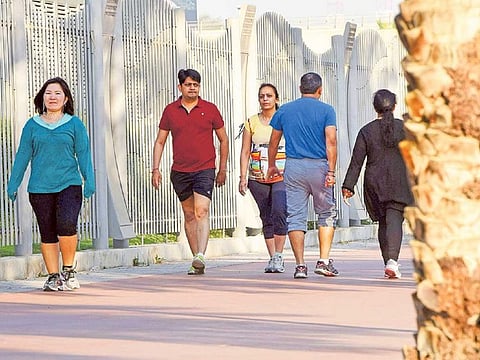COP28: Governments need to integrate walking, cycling into national transport policies, say experts
Path to decarbonising transport needs change in mindset, practice: UAE climate leader

Dubai: Governments are well placed to integrate walking and cycling into their national public transport policies. So said Bronwen Thornton, CEO of Walk21, a partnership for active health and travel, told audiences at COP28 on Wednesday.
On the day dedicated to transport at the climate conference, Bronwen said that walking and cycling being integrated into national transport policy “is the future”.
“While reviewing the nationally determined contributions (NDCs or countries’ self-defined national climate pledges under the Paris Agreement) of the 197 UNFCCCs member nations, it was found that only eight countries had an NDC for walking and cycling. So there is a lot of room for improvement,” she said.
Room for improvement
“We need to do more and be more ambitious,” said Bronwen, adding that countries often categorised walking and cycling policies as local modes of transportation. “But it is not. It can very well be integrated into national policy frameworks,” she added.
Walk21 is a UK-registered charity that supports the right to walk in a safe environment by providing evidence, tools, training and accreditation to politicians and academicians, for example.
The importance of including last-mile modes of transport such as walking and cycling was one of the critical topics of conversation at COP28’s transport day, following the revelation that transportation is responsible for about 60 per cent of world oil demand (according to the IEA).
The sector accounts for 22 per cent of global CO2 emissions.
Change in infrastructure
Revealing critical points from the WRI Ross Center for Sustainable Cities State of the Climate Report, Philipe Ramirez, the Urban Mobility Director for the Centre, said there has been some movement in climate-friendly adoptions within the transport sector.
“There have been 65 per cent more sales of electric vehicles within the last five years. However, we know that’s just one part of it, and we need more for pedestrians, cyclists and public transport systems and a significant expansion of electric buses,” said Ramirez.
He added that countries like India and Colombia have seen a massive spike in demand for electric buses.
“But we need to scale up infrastructure for electric vehicles more than six times compared to what we’re currently building if we need to hit NetZero by 2050. And we need protected bicycling lanes for cities as well,” he added.
Urgent action
Urgent action to cut emissions and transition to greener fuels is the need of the hour within the transport sector. Dr Nawal Al-Hosany, UAE’s permanent representative to the International Renewable Energy Agency (IRENA) and acting assistant undersecretary for green development and climate change at UAE’s Ministry of Climate Change and Environment, said: “The path to decarbonising transport is clear but challenging. We need a shift in mindset, policy and practice.”
She added, “The transport sector has emerged as a pivotal battleground for climate action. Twenty-two per cent of global CO2 emissions are from the transport sector, with freight emissions representing a growing share.”
She said the UAE has placed the environment, people, and policies first in its transport policies. “We have been a strong advocate for adoption of electric vehicles,” she said. The UAE has also been actively adopting sustainable aviation fuel (SAF) and piloted a high-speed green hydrogen refuelling programme.
Leadership
Young Tae Kim, Secretary-General of the International Transport Forum (an organisation within the OECD), said good governance and cross-sectoral collaboration are needed to achieve NetZero targets within the transport sector. “Central government can provide a legal framework and national guidelines for local governments to adopt. Moreover, citizens should get incentives from the government (for adopting sustainable means of transport).”
Commenting on the maritime industry’s race to NetZero 2050, Johannah Christensen, CEO of Global Maritime Forum, said: “Somewhere between 80 and 90 per cent of everything gets transported through the sea. With this key role in global trade, the maritime sector touches everyone. In progressing towards a zero-emission future, no one must be left behind in the transition.”
Meanwhile, regarding finance for the transport sector’s transition to clean, Mohammad Jamal Alsaati, Special Advisor to the Islamic Development Bank’s President (a multilateral development bank), said, “Energy and transport constitutes the highest investments from the bank’s perspective.”
Sign up for the Daily Briefing
Get the latest news and updates straight to your inbox






